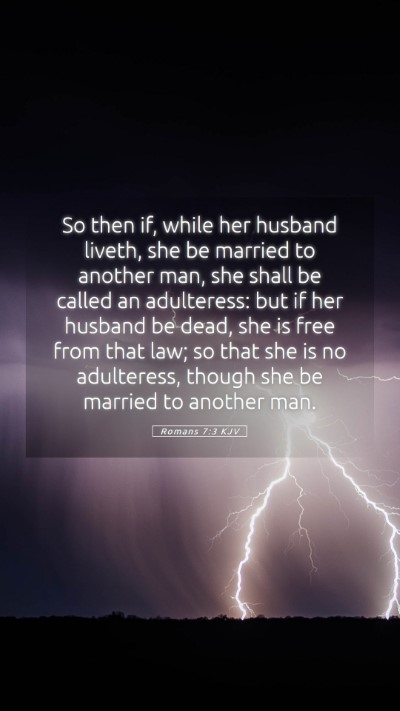Old Testament
Genesis Exodus Leviticus Numbers Deuteronomy Joshua Judges Ruth 1 Samuel 2 Samuel 1 Kings 2 Kings 1 Chronicles 2 Chronicles Ezra Nehemiah Esther Job Psalms Proverbs Ecclesiastes Song of Solomon Isaiah Jeremiah Lamentations Ezekiel Daniel Hosea Joel Amos Obadiah Jonah Micah Nahum Habakkuk Zephaniah Haggai Zechariah MalachiRomans 7:3 Meaning
What is the meaning of Romans 7:3?
So then if, while her husband liveth, she be married to another man, she shall be called an adulteress: but if her husband be dead, she is free from that law; so that she is no adulteress, though she be married to another man.
Romans 7:3 Bible Verse Meaning
Understanding Romans 7:3
Verse: Romans 7:3 states, "So then, if while her husband liveth, she be married to another man, she shall be called an adulteress: but if her husband be dead, she is freed from that law; so that she is no adulteress, though she be married to another man."
Bible Verse Explanations
This passage speaks about the laws governing marriage and illustrates a deeper spiritual truth concerning the law and grace. Here’s a breakdown of its components, drawing from noted biblical commentators:
1. Context of the Passage
- Marriage as a Covenant: The relationship between a husband and wife is viewed as a sacred covenant, emphasizing fidelity and the seriousness of the commitments made before God.
- Law and Grace: The metaphor of marriage here is used to explain the believer’s relationship to the law. Just as a married person is bound to their spouse, believers were once bound by the law before coming to Christ.
2. Insights from Commentators
Matthew Henry's Commentary
Henry emphasizes that the apostle uses the law of marriage to illustrate the believer's liberation from the law of sin and death through Christ. Just as death frees a woman from her marital obligations, so too does Christ's death free us from the law.
Albert Barnes' Notes
Barnes points out the legal implications of this analogy. He explains that a married woman is bound to her husband as long as he lives, but upon his death, she is free to remarry. This signifies how believers are no longer under the curse of the law because of Christ's sacrificial death.
Adam Clarke's Commentary
Clarke elaborates on the moral teaching of the passage, emphasizing that the law serves to highlight sin. Yet, through Christ's atonement, believers are given freedom to act righteously without the shackles of the law weighing them down.
3. Theological Implications
This verse stresses the significance of death—in context, both physical and spiritual. It serves as a reminder that through Christ's death, believers have a new identity, leading to a transformed life free from the power of sin and the burden of the law.
4. Application in Daily Life
- Freedom in Christ: Understanding that believers are released from the law helps in grasping the fullness of life found in Christ. This understanding can be transformative in how one approaches sin and grace.
- Commitment and Fidelity: Just as marriage symbolizes a covenant, it prompts believers to reflect on their personal commitments—both to God and to others—highlighting the importance of faithfulness.
5. Cross References
- Galatians 3:24-25: Explains the purpose of the law, acting as a tutor to bring us to Christ.
- Romans 6:14: Addresses sin not having dominion over us because we are not under the law but under grace.
- Ephesians 2:15: Discusses the abolishing of the law's commandments and ordinances through Christ's sacrifice, allowing for unity with God.
Conclusion
Romans 7:3 serves as a profound illustration of the believer's transition from a life bound to the law to one emancipated by grace through Jesus Christ. Through understanding this dynamic, individuals can gain a deeper insight into the significance of their faith and the implications for their daily lives. This insight is vital for anyone involved in bible study groups, seeking bible study resources, or participating in online bible study.


